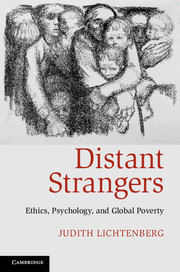Book contents
- Frontmatter
- Dedication
- Contents
- Preface
- Chapter 1 Introduction
- Chapter 2 Entanglements and the claims of mere humanity
- Chapter 3 Duties and rights, charity and justice
- Chapter 4 “Negative” and “positive” duties
- Chapter 5 Oughts and cans
- Chapter 6 Why people do what others do – and why that’s not so bad
- Chapter 7 Whose poor?/who’s poor?: deprivation within and across borders
- Chapter 8 Hopefully helping: the perils of giving
- Chapter 9 On motives and morality
- Chapter 10 Conclusion: morality for mere mortals
- Works cited
- Index
Chapter 10 - Conclusion: morality for mere mortals
Published online by Cambridge University Press: 05 June 2014
- Frontmatter
- Dedication
- Contents
- Preface
- Chapter 1 Introduction
- Chapter 2 Entanglements and the claims of mere humanity
- Chapter 3 Duties and rights, charity and justice
- Chapter 4 “Negative” and “positive” duties
- Chapter 5 Oughts and cans
- Chapter 6 Why people do what others do – and why that’s not so bad
- Chapter 7 Whose poor?/who’s poor?: deprivation within and across borders
- Chapter 8 Hopefully helping: the perils of giving
- Chapter 9 On motives and morality
- Chapter 10 Conclusion: morality for mere mortals
- Works cited
- Index
Summary
Most people no doubt agree that it’s a very bad thing for people to live in dire poverty, and so they are disturbed, if and when they realize it, to learn that more than a billion people in the world do. What moral claims, if any, does this situation make on the world’s comfortable people? It can be disagreeable to think about this question, since if you answer it by doing little you may feel guilty, and if you answer it by doing a lot you may find yourself deprived of many things you thought you wanted, needed, or were entitled to.
Despite the unease this question can produce, over the last forty years moral philosophers have thought a great deal about it. They deserve credit for daring to put an uncomfortable subject on the table. I would not have written this book had it not been for the path they have trod. Yet over the years I have become dissatisfied with the standard philosophical approaches. Their conclusions are too either/or: either we ought to give up a great deal to alleviate global poverty, or our moral responsibilities are quite limited. I have wanted to square the circle, you might say: to admit that global poverty is a great evil that demands action on the part of the world’s comfortable people, while also agreeing that morality cannot reasonably require a great deal of ordinary human beings on a regular basis. This book is my attempt to show how we might reconcile these apparently inconsistent propositions.
- Type
- Chapter
- Information
- Distant StrangersEthics, Psychology, and Global Poverty, pp. 235 - 252Publisher: Cambridge University PressPrint publication year: 2013



